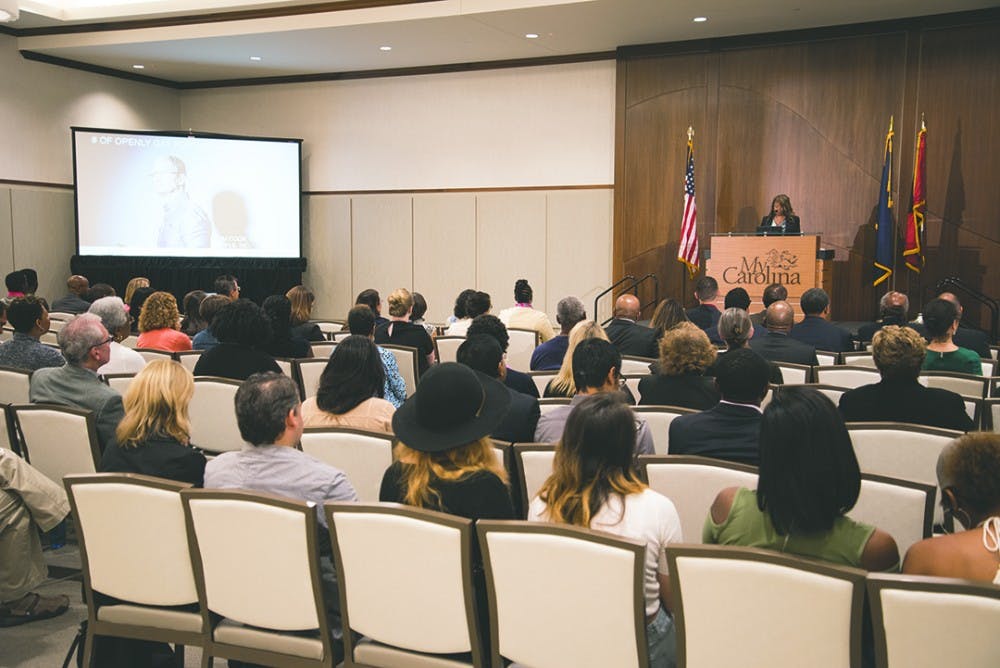The tenth annual James E. Clyburn Health Disparities Lecture brought attention to issues with health care equity for minority groups on Tuesday.
“We ought to treat people according to their needs. We ought to treat communities according to their needs, groups according to their needs,” Clyburn said. “That, in a very academic way, is what has been shared with us today.”
This year’s speaker was president and CEO of CommonHealth ACTION Natalie S. Burke. She spent her time on stage stressing the importance of minority equity and how to use privilege as a way to help the oppressed.
“Here’s how I think of it: Inclusion is the muscle of diversity, equity is its conscience and its soul,” Burke said.
The heaviest part of her lecture was the idea that not just oppression, but privilege as well, are detrimental to the existence of equality. She believes that this is because privilege does not prepare the privileged for equality, just like oppression does not prepare the oppressed.
“Privilege is like going up an up escalator: You stand on the step, you don’t have to make an effort, and you'll still end up at the top,” Burke said. “Oppression is like trying to go up a down escalator.”
She stressed the idea that the privileged do not realize their privilege, and so when it is taken from them in order to create equality, they feel oppressed.
“Privilege fails to prepare us for moments of equality. So here’s the thing, I’ve been reading more and more stories about people who have traditionally had privilege in this country experiencing equality, the same struggles that many people have experience on a day-to-day basis, but they just never thought it would happen to them,” Burke said, “And you know how they describe it? They say it feels like a boot on their neck and they can’t breathe.”
Burke believes that oppression is created through the misuse of power. She also believes that oppression in the U.S. is only still around because people choose for it to be. Due to these two factors, she makes the argument that because of how oppression and privilege work, people can put an end to them by properly using the powers granted to them.
“Prejudice, unconscious bias, and in-group bias, with the use or misuse of power through your decisions, behaviors and actions is how we get to the ‘-isms.’” Burke said.
Burke also spoke on her view of fairness. She has found that through the years, simply stating that things are, or should be, fair has left her in tough spot with people she is speaking to. Due to the relativity of the word fair, she has had to adjust her definition to what it is today.
“When I say fair, people say 'What’s fair? How do you measure fair? Quantify fair. Fair is subjective.' And it took me a long time to land in this place, so here’s what I’m going to suggest to you,” Burke said. “When you talk about fair or fairness, how I say it, how I describe it and what tends to defuse the conversation that often would like to come after that, is that fair is not about what I think it is or what you think it is. Fair is whatever is necessary to get a person, a community, a population, a nation to the best possible outcome.”
Burke believes that through using what she calls the “equity lens,” people in a position of privilege can help those who are oppressed by always considering how their actions will affect the community. By doing this, she says that society will be able to move towards a more equal future.
“Complacency is evil. If you have privilege and you’re not leveraging it, I have a problem with you. If I have privilege and I’m not using it, I have a problem with me,” Burke said.
Burke finished her lecture by stating that by using this “equity lens” people need to escape their respective echo chambers and move into the realm of what is uncomfortable to them. Only by doing this is society able to create a sustainable, equitable community.
“Remarkable leaders know the change in innovation, live at the edge of chaos, where the way is dimly lit and discomfort is the place to settle in,” Burke said. “All of these conversations about equity, diversity and inclusion are uncomfortable, and they better be, because if they’re not, you're not doing what you’re supposed to be doing.”

